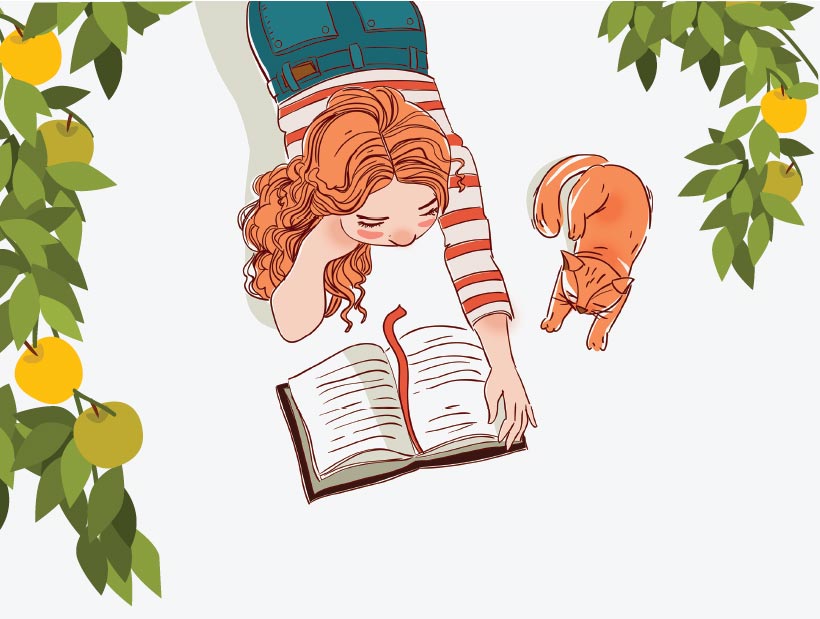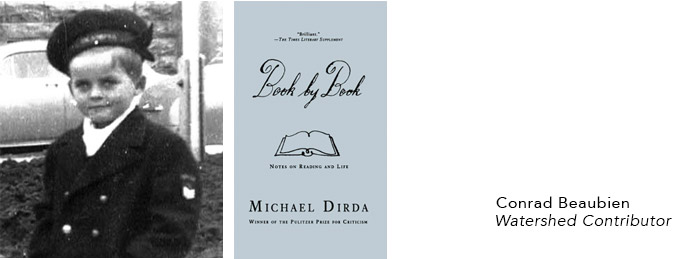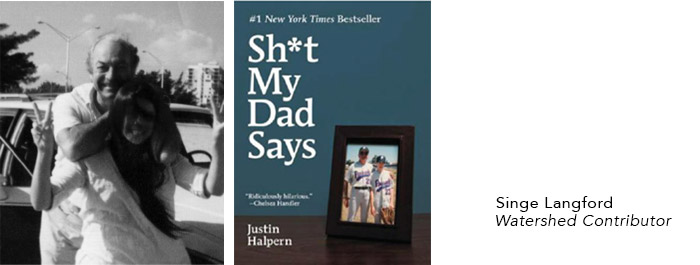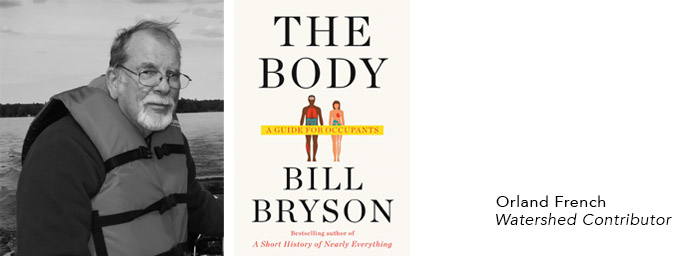









Getting lost in a book or a memory is what summer is all about.
Take a deep breath. After a spring like no other in recent memory, summer is here. Say it slowly to yourself: summer is here. It’s time to watch things grow, to feel warm breezes, to hear sounds of nature on a sultry evening. More than any other season, summer entices us to sleep during the daytime, to wear flip-flops everywhere, to walk slowly down a country road with no destination.
And to read, of course. Nine members of the Watershed team have stirred themselves to share their favourite summer reading choices. Some are new, some are classics, all will breathe new life into whoever reads them.
“Books are good company, in sad times and happy times, for books are people – people who have managed to stay alive by hiding between the covers of a book.” E.B. WHITE

Janet Davies – Watershed Contributor
Summer memory
In the 1960s, my large family rented small cottages. Invariably dim, dark and not on the water, but filled to bursting with damp children, hot dogs and laughter. In 1989 we did it one more time, but with lakefront, a games room and nine bedrooms. With 23 of us, we still filled it up – with our own damp children, our dear old mum and a ton of love and laughter.
The Alice Network by Kate Quinn
Harper Collins, 2017
Perhaps my biggest lockdown challenge was that libraries and my favourite secondhand bookstores were closed.
Being resistant to screen reading, I ransacked my bookshelves and found The Alice Network, a secondhand score. I read it. I loved it. I should have saved it for lazy summer reading, but instead I gobbled it up in a week. The novel tells parallel stories of two young women – terrific characters, flawed and funny and brave. One is Charlie a rebellious American socialite, single and pregnant in 1947, itself an interesting situation, who is looking for a beloved cousin who went missing in wartime Europe. The other is Eve, a young English woman, recruited in 1915 to become a spy in the real-life Alice Network in German-occupied France. Terrible things happen, romantic and funny things happen. The wartime story is enthralling. The “modern” story is an exciting search for two people, one good, one evil by Charlie and a wily, half-mad, vengeful old English woman.

Conrad Beaubien – Watershed Contributor
Summer memory
Air currents as messengers of the gods: tack, come about, jib, rudder, keel, and mainsail were elements of sailing know-how I learned the summer I turned thirteen. To set free in a breeze, to chart waters unknown, and to steer through rogue winds have held fast as lessons that guide my way through life.
Book by Book: Notes on Reading and Life by Michael Dirda
Holt 2007
I’m into a re-read of Book by Book by Michael Dirda, a Pulitzer Prize recipient for criticism and a longtime staff writer for the Washington Post. Book by Book steers the reader onto a seemingly endless path of literature, both classic and contemporary. The author encourages the reader to investigate, to read at whim, to explore an array of fields. Chapter by chapter Dirda situates the lives of authors and their contemporaries in time and place: The Pleasure of Learning, The Books of Love, The Interior Library. He also names past and present authors he believes to have been hugely neglected. My third read of Book by Book is as fresh as the first and second go-rounds, like revisiting a map and being repeatedly surprised by where the side roads lead. My reading preferences usually slant to nonfiction, however Dirda’s volume has seduced me into broadening the page. Jane Austen, James Joyce and the writings of Robertson Davies have squirrelled themselves into the hammock alongside the Cheshire cat and me.

Signe Langford – Watershed Contributor
Summer memory
I spent my free-range childhood and adolescence in a small country town, where every summer is a good memory now. Swimming, riding, exploring, and later, all that exciting teenage stuff – under the stars. Summer was my father’s favourite season too, and when I wasn’t off somewhere, we enjoyed it together, gardening, fishing, sailing, going for drives in the convertible, and heading down to the wharf to watch a thunderstorm come in over the Lake of Two Mountains, where, he said, with the rubber tires, we were safe from the lightning we were waiting to see.
Sh*t My Dad Says by Justin Halpern
It Books/Harper Collins 2010
I love reading books that detail other people’s relationships with their fathers. I recently read an older book, Sh*t My Dad Says by Justin Halpern. It’s the kind of book that’s perfect for summer reading; it’s light, very funny, and made up of tiny chapters and hilarious bullet point quotes from the author’s delightfully blunt dad. You can pick it up and put it down and get the pages wet, dirty, or coconut oiled. And – best news ever – there’s a sequel that’s on my shopping list: More Sh*t My Dad Says!
Here’s a helpful nugget from Halpern’s dad on managing one’s bank account: “Don’t get mad at the overdraft charge…No, no – see, there’s your problem. You think of it as a penalty for taking out money you don’t have, but instead, it might help you to think of it as reminder that you’re a dumb shit.”

Jeanne Beker – Watershed Contributor
Summer memory
One of my biggest rock ‘n’ roll fantasies was realized in the summer of ’69. As an enthusiastic 17-year-old, sporting a yellow bikini top with black pompoms, I attended the first Toronto Pop Festival at Varsity Stadium. I was up front, and started dancing my heart out to Ronnie Hawkins’ version of “Bo Diddley.” Ronnie must have spotted my shaking pompoms. He suddenly pointed at me, motioning for me to come up on stage. Before I knew it, I was boogying it up alongside Ronnie and the boys, in front of a crowd that was 60,000 strong!
The Chiffon Trenches by André Leon Talley
Ballantine Books 2020
The fashion crowd feeds on drama, and though our world is rife with illusion, we all long for a look at what’s really behind those designer curtains. That’s why style enthusiasts are chomping at the bit to dive into André Leon Talley’s eagerly anticipated autobiography, The Chiffon Trenches. Having worked in those trenches myself for almost three decades as the intrepid host of Fashion Television, there was one thing that always made my heart beat faster: a salient soundbite from the flamboyant Talley, Vogue’s beloved creative director, and later, editor-at-large.
Talley, a larger-than-life character, who moved to New York from the Deep South to pursue a career of uber fabulousness, began honing his skills answering the phone for Andy Warhol at Interview Magazine and later went on to be mentored by Vogue’s legendary Diana Vreeland. He understood fashion and the zeitgeist better than anyone, and never failed to spew the most outrageous and often hilariously shocking observations about what just went down the runway.
But despite his electric exterior, Talley now reveals there was quite a lot of suffering going on. In his new book, Talley does the unthinkable: He disses high style priestess Anna Wintour and goes for the jugular, blaming the famous editor-in-chief for rudely abandoning him when she no longer needed him. Talley also speaks openly about the racism and prejudice he encountered in the scene – subject matter that’s been pretty much verboten until now. There’s no question that The Chiffon Trenches promises to be the summer’s juiciest read. Personally, I can’t wait to compare notes with the fearless and fabulous Mr. Talley.

Stephanie Campbell – Watershed Managing Editor
Summer memory
Every summer when I was young, our family would load up our hot and cramped Chevy Nova with all types of beach paraphernalia and head to our favourite seaside town. The final destination was Kennebunkport, Maine and a picture-perfect, New England-style white clapboard inn complemented by tidy green accents and a wraparound porch for après-beach cocktails. Or in my case – a grape Fanta. Our days were spent digging for clams, collecting various critters from the tide pools and wrapping ourselves in miles of slippery sea kelp. Afterwards we would collapse into bed, exhausted from a day in the sun and the surf and dream of the treasures we would find the next day.
Recipe for a Perfect Wife by Karma Brown
Viking 2020
One of my favourite writers – and friend and mentor – is Karma Brown. In each of her books she weaves the perfect summery tale of love, family and emotionally wrought scenarios. These are the kinds of stories you pick up once and don’t put down until the final page is turned and you mourn the fact that there are no more words to cherish. I haven’t yet read Karma’s latest novel, Recipe for a Perfect Wife, as this was the year I was determined to carve out more “me-time” and was saving this meticulously inter woven tale for the summer of 2020. Ironically, I will have more time this summer to read and bake and cook and be more present, which actually makes this the perfect summer book to lose myself in. Recipe for a Perfect Wife tells the story of present-day Alice who discovers an old cookbook in her new house and subsequent new life. Alice pores through the recipes and begins to feel a connection with the original owner of the cookbook (and the house), Nellie – the quintessential 1950s housewife. What might seem like a sunny story at the outset quickly dissolves into a mysterious, sinister and troubling plot to take down the patriarchy. Now, hand me a gimlet and my apron and stand back.

Tom Cruickshank – Watershed Contributor
Summer memory
Summer isn’t summer unless I spend some time by the water. All the better if that water is far, far away… which reminds me of an excursion to the west coast of Newfoundland several years back. At the time, I worked for a national magazine and was covering several stories there. Between meetings and interviews, there were some wonderful distractions: sea kayaking at Woody Point or mountain biking in the tablelands at Gros Morne. Water was always close at hand.
Crow Lake Mary Lawson
Knopf 2002
My book was also close at hand. On the plane, before bed, whenever there was a lull, my nose was buried in Crow Lake, the debut novel by Mary Lawson. Set in Northern Ontario, water is never far from the mind as the story of two neighbouring families unfolds. Tragedy dogs them both, and when they finally collide the fallout is truly astounding. Had it been told with sensationalism or melodrama, the narrative might have read like a soap opera, but Lawson’s writing style saves it. She is spare with her words, baiting the reader with just enough detail but never giving anything away until the very end. As each page turned, I wished I could write like that.
Lawson was in her mid-50s when Crow Lake first appeared in 2002. (Maybe there’s hope for all of us notso- young would-be novelists.) Her thoughtful, concise style also shows to advantage in her two subsequent novels: The Other Side of the Bridge (which is even better) and a Crow Lake sequel called Road Ends. I haven’t read the last one yet, but I’m sure this summer, somewhere near water, the opportunity will arise. And I won’t be disappointed.
In this mad season of COVID-19, The Body shows us how fragile and vulnerable is this earthly vehicle we lumber around in.
ORLAND FRENCH

Orland French – Watershed Contributor
Summer memory
One of the tricks at our cottage is to use it as a celestial clock. We always get two sunsets. To see the first one, stand at the shore and watch the sun dip below the horizon. Then, if you are young or agile enough, race up the trail to stand on the cottage deck, about 10 metres above the water, and watch the sunset again. Kids love this lesson in nature and astronomy because it leads to questions of How? Why? But you can fool them only once.
The Body: A Guide for Occupants by Bill Bryson
Doubleday Books 2019
Anything written by Bill Bryson is a complete work. As my body ages and parts break down, I turn to Bill to see what I’m dealing with. It’s not a medical book; it’s a guide to the creation and evolution of the human body. So many parts I’ve never heard of! Bryson is author of A Short History of Nearly Everything and 18 other books, but the body seemed to need its own book in what he describes as an “owner’s manual”.
In this mad season of COVID-19, The Body shows us how fragile and vulnerable is this earthly vehicle we lumber around in. The body is a complex bag of skin, holding together bones and guts for feeding oxygen to the brain. Essentially that’s all it does. Presumably with our brain we are expected to create, invent or design something to further the human race and improve the world. If not, we have other parts which serve as a platform for creating another generation to try again. (See Chapter 17: “Into the Nether Regions”).

Jane Kelly – Watershed Publisher
Summer memory
We didn’t have a cottage, but we lived on the banks of the Rideau River. As kids we spent hours poling our rafts through the weeds, catching frogs, turtles and fish. At the end of the day, Mom called us off the river with a cowbell. We would straggle up the bank tired and sun- burnt, bursting to talk about our adventures around the dinner table.
The Gown by Jennifer Robson
William Morrow 2018
Jennifer Robson’s latest book of historical fiction, The Gown, revolves around the creation of Princess Elizabeth’s wedding gown in the ateliers of royal couturier, Norman Hartnell. The story begins when Heather Mackenzie inherits a box of exquisitely embroidered flowers from her grandmother and then unfolds as Heather delves deeper into her grandmother’s role in the creation of the royal gown: her friendships, her romances and eventually the secrets that had been locked away in the embroidery workrooms for seventy years.
In some ways the plot is predictable, but nonetheless I was fascinated by the excitement that surrounded the princess’s wedding during the post-war period and the descriptions of the strict, secretive work rooms where the “girls” stitched tirelessly on the intricate details of the gown. The book brought back memories of my English grandmother. I remember her telling me how she was taught to embroider as a girl – how she was to keep her head high and her hands out of her lap and how, if her eyes or head dropped down towards her chest, her teacher would tap upward on her chin with a pointer. Her embroidery was worked into my own wedding gown.

Chris Cameron – Watershed Editor and Contributor
Summer memory
I love the heat, and my most memorable summers were the hottest ones. When I step outside into a stifling summer day, I think, “I wait all year for this.” Even during a triathlon once in the Okanagan in the summer of 2011 when it was so hot they ran out of water and we runners stalked the finish line like zombies, there was still no place I would rather have been. One of my favourite places in the world? Death Valley, California, where the daytime temperature can reach 45° C.
To the Edge: A Man, Death Valley, and the Mystery of Endurance by Kirk Johnson
Warner Books 2001
Every July in Death Valley National Park, a group of athletes gather to go for a run. In fact they run 135 miles, in a searing endurance race called the Badwater Ultramarathon. I first heard of Badwater when I read To the Edge, a 1999 memoir by New York Times reporter Kirk Johnson, whose editor had sent him to do a story on the event. He ended up running it himself – and finishing.
After I read the book, I could not get Death Valley out of my mind, and in 2008 I made the first of many visits there to go cycling. I was moved by its quiet desolation, its stark scenery – and its heat.
One year I decided to run a fraction of the ultramarathon distance on my own, about 30 kilometres from Badwater to Furnace Creek. It was the run of a lifetime, and yes, it was hot. Each trip I took my copy of To the Edge. Eventually it fell apart and I had to buy another one.
My Death Valley cycling and running days are over, but I still have the book. And the summertime provides the heat.
Story by:
Watershed Writers
